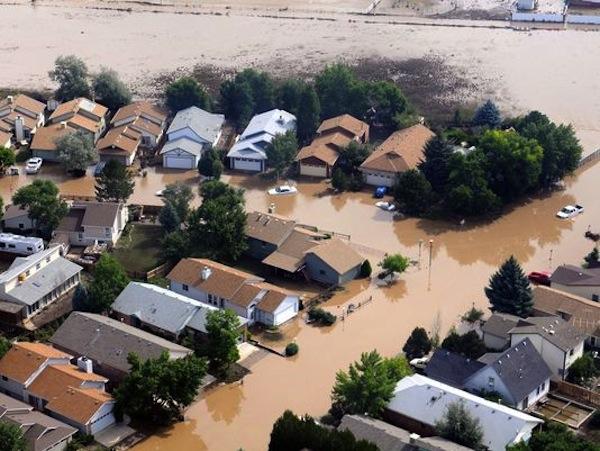
U.S Army via Environmental Protection Agency
Flood-damage homes in Boulder, Colorado, on September 14.
By Carol Berry, Indian Country Today Media Network
Boulder, Colorado collectively shouldered the job of cleaning up after flooding from torrential rains that fell for days, overrunning parched fields and inundating homes in a 17-county area and prompting one American Indian to point to global change as the culprit.
The deluge was, depending on the source, a 100-, 500- or 1,000-year record flood that left at least eight people confirmed or presumed dead, including an American Indian youth.
RELATED: Native Youth Among Seven Killed in Raging Colorado Floodwaters
But there’s no guarantee that severe flooding won’t occur even sooner than 100 years, said Theresa Halsey, Hunkpapa Lakota, who produces the Indian Voices newsletter and other material for KGNU Community Radio.
“This world is out of order,” she said, citing “wild and crazy” hurricanes and tornadoes and global warming-related rising waters from the Arctic.
Halsey’s lower-level apartment was damaged by floodwater that soaked carpets and will have to be dried to ensure there’s no mold, so she had to move furniture and other belongings into the hallway. Her temporarily waterlogged life is probably better than that of people who had sewer backups and loss of power, she said, adding that she was particularly fortunate since she lives near Boulder Creek, which flooded.
Other Indians had similar experiences in Boulder, where the University of Colorado and Boulder Valley public schools closed down for the day on September 17. Nearly 12,000 people were evacuated in north-central and northeast Colorado, where many of the state’s 30,000 non-reservation Indians reside. Flooding that began on September 11 resulted from five to 15 inches of rain, depending on the area, the state’s office of emergency management said. Dozens were being airlifted to safety on Wednesday September 18, and hundreds more were stranded or still unaccounted for.
Natives in the flood-torn area had harrowing tales of escape and near-misses. Lori Windle, Objibwe, a founder of the Society for American Indian Government Employees, heard a loud roaring on September 12 and realized that nearby Coal Creek had risen from about two feet to some 30 feet, widening rapidly and uprooting trees.
At that point she realized she should leave, particularly after talking with a Houma woman she knew who worked for the Federal Emergency Management Agency and who told her they were “getting ready to declare it a disaster area.” She spent the night at her daughter’s house. Windle was among the lucky ones —her house was spared as the floodwater lapped at the foot of her driveway.
Carolyn Hayes, Navajo, who creates Indian regalia and does craft work, lives in a second-floor apartment in Boulder and is concerned that some of her belongings in a basement storage area may have been water-damaged, but a sprained ankle had prevented her from checking. She too recalled the rushing water of September 12.
They and other area residents were glad to see clearing skies on September 16 as estimates for rebuilding and repair soared into the hundreds of millions of dollars. State emergency management officials said that official early estimates would be made next week. Rebuilding could take at least a year for the thousands of homes and businesses affected and for hundreds of bridges and roads that have been destroyed.
Meanwhile, run-over from the floodwaters seemed to be heading toward Nebraska and the South Platte River, which courses south of Denver and into the neighboring state.
“The exact crest stages are still uncertain as the waters are just moving into Nebraska,” according to the National Weather Service. “It is possible that upcoming forecasts could change so those along the river should stay tuned for updated information.”
Read more at http://indiancountrytodaymedianetwork.com/2013/09/18/colorado-natives-recount-harrowing-escapes-floods-recede-head-nebraska-151338
